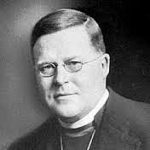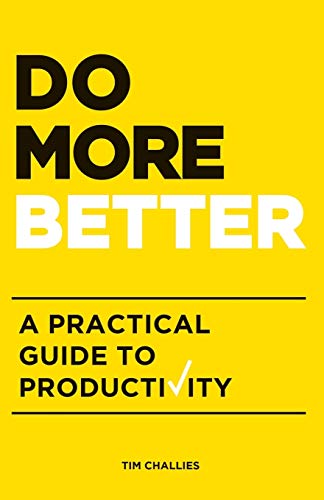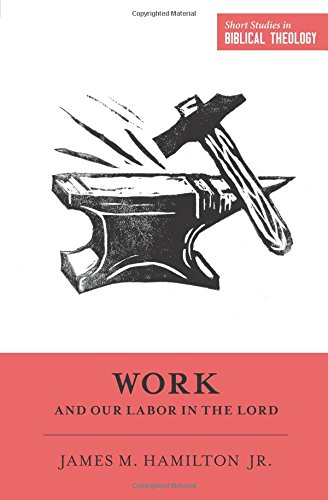Quotes about Work
If by doing some work which the undiscerning consider “not spiritual work” I can best help others, and I inwardly rebel, thinking it is the spiritual for which I crave, when in truth it is the interesting and the exciting, then I know nothing of Calvary love.
Twentieth-century man needs to be reminded at times that work is not the result of the Fall. Man was made to work, because the God who made him was a “working God.” Man was made to be creative, with his mind and his hands. Work is part of the dignity of his existence.
The devil visits idle men with his temptations. God visits industrious men with His favors.
We meet God the Creator as a worker in Genesis 1:1 – 2:2… The image of God in man means man is to be a worker. The way we work will reveal how much we have allowed the image of God to develop in us.
Disciplines of a Godly Man, Crossway Books, 1991, p. 148- 149. Get this book!
Genesis 1 logs God’s commitment to excellence when it says, “God saw all that He had made, and it was very good” (v. 31). Christians should always do good work. Christians ought to be the best workers wherever they are. They ought to have the best attitude, the best integrity, and be the best in dependability.
Disciplines of a Godly Man, Crossway Books, 1991, p. 154. Get this book!
It is because of our fallen state that some are lazy and refuse to work, while others are slothful and careless in their work. Sin causes some to view work selfishly – solely from a financial perspective. In other words, they have little regard for the service they may be able to render to God or the glory due to Him. They view work only as a way to get money and thus stuff for themselves.
Work is so foundational to our makeup that it is one of the few things we can take in significant doses without harm. Indeed, the Bible does not say we should work one day and rest six, or that work and rest should be balanced evenly – but directs us to the opposite ration. Leisure and pleasure are great goods, but we can only take so much of them. If you ask people in nursing homes or hospitals how they are doing, you will often heart that their main regret is that they wish they had something to do, some way to be useful to others.
Work, especially in this economy, is an occasion to trust God (Lord, please provide for my family’s needs), thank God (Lord, thank you for the work you’ve given me), and love God (Lord, help me to work in such a way as to bring glory and honor to your name). Am I seeking my identity not in what I do, but in Who I know?
The idea that the service to God should have only to do with a church altar, singing, reading, sacrifice, and the like is without doubt but the worst trick of the devil. How could the devil have led us more effectively astray than by the narrow conception that service to God takes place only in church and by works done therein… The whole world could abound with services to the Lord…not only in churches but also in the home, kitchen, workshop, field.
What you do in your house is worth as much as if you did it up in heaven for our Lord God… We should accustom ourselves to think of our position and work as sacred and well-pleasing to God, not on account of the position and work, but on account of the word and faith from which the obedience and the work flow.
The works of monks and priests, however holy and arduous they be, do not differ one whit in the sight of God from the works of the rustic laborer in the field or the woman going about her household tasks, but that all works are measured before God by faith alone… Indeed, the menial housework of a manservant or maidservant is often more acceptable to God than all the fastings and other works of a monk or priest, because the monk or priest lacks faith.
No unwelcome tasks become any the less unwelcome by putting them off till tomorrow. It is only when they are behind us and done, that we begin to find that there is a sweetness to be tasted afterwards, and that the remembrance of unwelcome duties unhesitatingly done is welcome and pleasant. Accomplished, they are full of blessing, and there is a smile on their faces as they leave us. Undone, they stand threatening and disturbing our tranquility, and hindering our communion with God. If there be lying before you any bit of work from which you shrink, go straight up to it, and do it at once. The only way to get rid of it is to do it.
Am I in a calling in which I can abide with God? If you cannot ask God’s blessing upon your occupation, or if you would be ashamed to be found in it when the Lord Jesus returns, or if it hinders your spiritual progress, then you must give it up and be engaged in something else.
The Autobiography of George Muller, 1984, p. 169. All quotations taken from books published by Whitaker House are used with permission of the publisher. Whitaker House books are available at Christian bookstores everywhere. Get this book!
Why do I carry on this business, or why am I engaged in this trade or profession? In most instances the answer would be, “I am engaged in my earthly calling so that I may support myself and my family.” Here is the chief error that causes almost all the other errors by children of God concerning their calling. To be engaged in a business merely to obtain the necessities of life for ourselves and family is not scriptural. We should work because it is the Lord’s will concerning us” (Eph. 4:28).
The Autobiography of George Muller, 1984, p. 169. All quotations taken from books published by Whitaker House are used with permission of the publisher. Whitaker House books are available at Christian bookstores everywhere. Get this book!
God wants us to follow a recurring pattern of intense work and then rest, intense work and then rest, and so forth. Whatever view one takes of the Sabbath, surely the six days of work and the one day of rest embedded in the creation remain relevant in some sense. Any routine of life that is unsustainable long-term cannot be of God. He calls us to work. But he also calls us to rest, in order to work most fruitfully. What sets us apart is this. We rest, in order to work; we do not work, in order to rest. We who believe the gospel are not living for the weekend, but for The End. In the meantime, we figure out rhythms of life that make fruitful labor sustainable.
We live in a post-vocational age. Without any theology of vocation we lapse into debilitating alternatives: fatalism (doing what is required by “the forces” and “the powers”); luck (which denies purposefulness in life and reduces our life to a bundle of accidents); karma (which ties performance to future rewards); nihilism (which denies that there is any good end to which the travail of history might lead); and, the most common alternative today, self-actualization (in which we invent the meaning and purpose of our lives, making us magicians). In contrast the biblical doctrine of vocation proposes that the whole of our lives finds meaning in relation to the sweet summons of a good God (Paul Stevens).
The Other Six Days: Vocation, Word, and Ministry in Biblical Perspective, Eerdmans, www.eerdmans.com, 1999, p. 72.
Why is work important? Not because by working harder we will get richer; there is no simple equation between hard work and wealth. We work essentially because we have been given gifts of creativity to use in God’s world. Work is our human activity which corresponds to the work of God in His providential care for the whole created order (David Atkinson).
The Puritans declared the sanctity of all honorable work. In so doing, they rejected a centuries-old division of callings into “sacred” and “secular”… This Puritan rejection of the dichotomy between sacred and secular work has far-reaching implications. It judges every honorable job to be of intrinsic value, and integrates every vocation with a Christian’s spiritual life. It makes every job consequential by regarding it as the arena for glorifying and obeying God and for expressing love (through service) to a neighbor.
Puritan Work Ethic: the Dignity of Life’s Labors, Christianity Today, October 1979, p. 15
When it comes to the slothful, the Bible pulls no punches. It is a hideous offense that discredits our testimony, displays our selfishness, dismisses our spiritual responsibilities and mocks the nature of our Creator to whom we are to emulate.
Based on the principles of Colossians 3, Ephesians 5-6, 1 Peter 1, 1 Corinthians 7 and 1 Timothy 6, here are some specific ways you can make Christ shine in your place of employment. Do what the boss tells you to do without complaining. Work with excellence. Work hard, even when the leader’s eyes are not on you. Complete your assignments on time. Make an impact for a wholesome environment. Be trustworthy, Be a good steward of your God-given talents. Arrive on time if that is expected. Do not take what does not belong to you (e.g. office supplies). Be grateful. Work cheerfully. Love others.
Work is always healthier for us than idleness; it is always better to wear out shoes than sheets.
The shop, the barn, the scullery, and the smithy become temples when men and women do all to the glory of God!
The theological roots of this concept of “vocation” are found in the biblical doctrine of creation and divine sovereignty. We are by God’s creative decree shaped in His image and thus designed to reflect in all our endeavors the purposeful activity of God Himself. All Christians, therefore, should ideally embrace their “work”, however secular and uneventful it may appear, as a calling of God, a responsibility for which they have been uniquely endowed that is designed in its own way to glorify God. One’s “job” or “career” or “occupation” thus has a meaning beyond mere personal fulfillment. “Ministry” is therefore not what the majority of Christians perform as “a discretionary time activity – something done with the few hours that can be squeezed out of the week’s schedule after working, sleeping, homemaking, neighbouring, washing and doing the chores” (Stevens, The Other Six Days, 132). It is, rather, all of life when discharged in faith.
Are You Called to Ministry – Part I, November 8, 2006, www.enjoyinggodministries.com. Used by Permission.
To choose a career on selfish grounds is probably the greatest single sin that any young person can commit, for it is the deliberate withdrawal from allegiance to God of the greatest part of time and strength.
As we carry out our responsibilities on our jobs, here are some questions we would do well to ask ourselves: 1. Do I regularly thank God for my job – whether it is a president of a Fortune 500 company or a garbage collector? 2. Do I properly respect those at work in authority over me, even those whose religious, political or moral convictions are different from mine? 3. Do I work heartily in whatever vocation I am placed – knowing that my service is to the Lord? 4. Do I work hard even when the boss is not watching? 5. Do I strive to have as good a reputation with my coworkers as I have with my fellow church members? 6. Do I work as efficiently as possible as to make my company profitable? 7. Do I refrain from cutting any moral corners on the job? 8. Do I make suggestions on how to improve job performance and morale? 9. Do I refrain from conversations in which the boss or supervisor is criticized? 10. Do I refrain from taking small items from my employee – paper clips, copy paper, pencils, etc. – even though “everyone else does it?” 11. Do I make personal copies on the company copier? 12. Do I use the company Internet connection for my personal use? 13. Do I fudge on my expense account or time card? 14. Am I the same person on the job as I am when away from the job? 15. Do I encourage employer respect, rather than helping create employee dissatisfaction? 16. Are my work habits sloppy, or do I attempt to always produce work of excellence? 17. Am I on time, or am I often tardy at work? 17. Do I misuse sick leave or personal leave days? 19. Do I abuse workers’ compensation benefits? Do I remind myself regularly that my job performance and general attitude can bring either glory, or dishonor, to my Lord? 20. Do I use company time to witness to my lost co-workers, or do I wait until break time or lunch time? 21. Do I remind myself regularly that my job performance and general attitude can bring either glory, or dishonor, to my Lord?
Life in the Body of Christ, Founders Press, 2006, p. 47-48, www.founders.org. Used by Permission. Get this book!
If we look externally, there is difference between washing dishes and preaching the Word of God, but as touching to please God, there is no difference at all. That’s a biblical view of work, that there’s no difference when done to the honor of the Lord between preaching and washing the dishes.
When God says “work,” He doesn’t say that everyone must produce two tents daily. No, He simply implores us to work “unto the Lord,” to the best of our abilities (see e.g., Matt. 25:14-30; Luke 12:47-48; Eph. 6:7). Although we never minimize or excuse sinful behavior, we treat people with one talent as if they have one talent, those with five as if they have five. We treat people according to their abilities.
Blame in on the Brain? P&R Publishing, 1998, p. 55. Get this book!
But though I am always in haste, I am never in a hurry, because I never undertake any more work than I can go through with perfect calmness of spirit.
Quoted in: Bill Thrasher, A Journey to Victorious Praying, Moody Publishers, 2003, p. 179.























